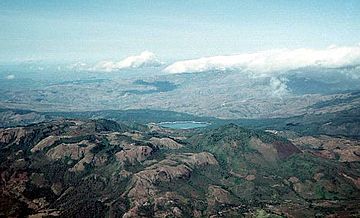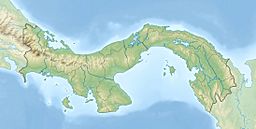La Yeguada facts for kids
Quick facts for kids La Yeguada |
|
|---|---|

La Yeguada (foreground) in 1994. Laguna La Yeguada is also visible.
|
|
| Highest point | |
| Elevation | 1,297 m (4,255 ft) |
| Geography | |
| Parent range | Serranía de Tabasará |
| Geology | |
| Age of rock | Miocene, Pliocene, Pleistocene |
| Mountain type | Stratovolcano |
| Last eruption | 1620 AD |
La Yeguada, also known as Chitra-Calobre, is a large volcano in Panama. It is found in the Veraguas Province, north of the Azuero Peninsula. This volcano is known as a stratovolcano, which means it's tall and cone-shaped.
About La Yeguada Volcano
Scientists have studied La Yeguada volcano. They found that it is an active volcano. It is part of a long chain of volcanoes in Central America that stretches into Panama. Studies show that this volcano has been active for a very long time. Its rocks tell a story of volcanic activity that started about 20 million years ago and continues to this day.
Nature and Farming Around La Yeguada
The area around La Yeguada is full of different kinds of trees. One common tree is the guayacane. These trees are now very common in the Azuero Peninsula region.
The valley near the volcano is also used for farming. It has large areas of grassland where animals graze. The Laguna La Yeguada (La Yeguada Lake) helps a lot with this. It acts like a natural irrigation system, providing water. This water keeps the plants and animals in the region from getting dehydrated.
The forests in this valley are important for wood production. Much of Panama's cedar wood comes from these woods.
Images for kids
See also
 In Spanish: Volcán La Yeguada para niños
In Spanish: Volcán La Yeguada para niños
- List of volcanoes in Panama
 | Audre Lorde |
 | John Berry Meachum |
 | Ferdinand Lee Barnett |





